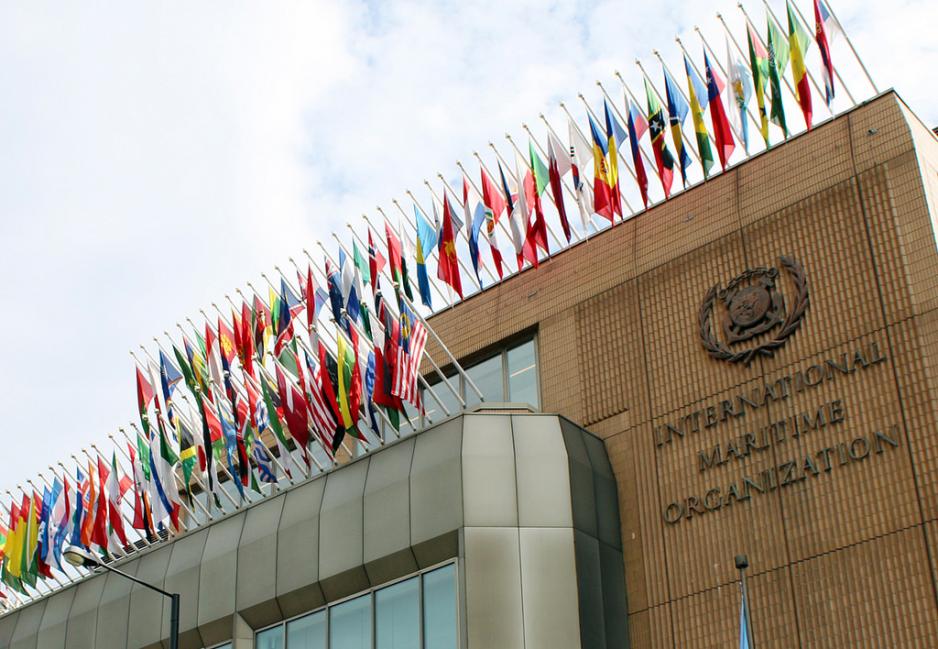Heavy fuel oil: "Lots of Arctic rhetoric but no action"

A group of environmental protection organisations are concerned about the International Maritime Organization not sufficiently tackling the issue of heavy fuel oil use by vessels in Arctic waters. (Photo: International Maritime Organization (IMO)
John Kaltenstein, Marine Policy Analyst at Friends of the Earth, severely criticises the lack of substantive action taken by Arctic states to reduce and/or ban heavy fuel oil for Arctic shipping.
John Kaltenstein, Marine Policy Analyst at Friends of the Earth, severely criticises the lack of substantive action taken by Arctic states to reduce and/or ban heavy fuel oil for Arctic shipping.
Heavy fuel oil (HFO) is considered a significant hazard to the Arctic marine environment, including to wildlife and coastal communities as potential HFO spills are not only difficult, but also almost impossible to clean up.
A 2014-study concluded that HFO spills are up to 50 times more toxic than medium and light crude oil spills and account for roughly 60% of ship-sourced oil spills worldwide. Moreover, burned heavy fuel oil produces harmful and significantly higher emissions of sulphur, nitrogen oxides and black carbon.
The topic of HFO was most recently again discussed at the Arctic Council Protection of the Marine Environment (PAME) Working Group in Stockholm and has, as a matter of fact, been assessed by the Working Group ever since the landmark 2009 Arctic Marine Shipping Assessment (AMSA). And yet, up to the present related assessments have not been beyond the scope of discussion and the sharing of (political) opinions on the subject matter.
"No substantial progress"
"Over time, the lack of substantial progress becomes rather exhausting as our arguments keep on falling on deaf ears", says Kaltenstein. "The merits are definitely on our side but the politics don’t seem to be".
Accordingly, the response of Ambassador David Balton, the US Senior Arctic Official to an open letter on the topic, published by 15 NGOs (non-governmental organisations), including Friends of the Earth, fits the mould. "It was short, to the point and concluded that PAME was looking at the risks involved and options for minimizing those risks – but no timeline was given as to when recommendations would be coming".
Within PAME, the US leads the work on a paper concerning the issue, entitled ‘Heavy Fuel Oil releases from Shipping in the Arctic’. The paper is a joint effort of the US, Russia, Denmark, Norway and Iceland.
"Yet, at some point one wonders if the Arctic states are actually indeed listening", Kaltenstein concluded. "HFO seems like a cheap drug. It’s relatively easy and inexpensive to produce, it has been used for decades, we are all aware of the dangerous effects it has on the (Arctic) environment and yet its use continues".
"Re-assessment of legal options is necessary"
Kaltenstein particularly expects the International Maritime Organization (IMO), the specialised UN agency responsible for regulating shipping, to better attend to that matter.
"Seven years since AMSA it is necessary to re-assess the legal options for reducing the environmental risk of HFO use in Arctic waters." Although a range of IMO measures to reduce the increasing risk of a major pollution incident occurring already exist, the topic of including limitations on heavy fuel use has been prominently neglected within last year’s established Polar Code, as recently referred to by Victoria Herrmann in a related High North News article.
Accordingly, Kaltenstein would like to see the US – the current chair of the Arctic Council – to show considerable leadership at both the Arctic Council, but essentially also the IMO.
"In order to effectively stimulate debate on the topic of banning the use of HFO, a strong Arctic coalition at IMO would be necessary – a collaboration of (some of) the Arctic states with one of the eight basically leading the effort and driving discussion."
However, this has not (yet) been the case. "We hope that an Arctic ban on the use of HFO could be reached by 2020. But in order to meet that objective, we eventually need an Arctic state that effectively carries the issue forward – for the sake of the Arctic (marine) environment, subsistence practices, and the climate."
More stories:
Blacklisting Black Carbon: Heavy Fuels and Shipping in the High North
New Rules to Ensure Cleaner Shipping in the Arctic
Skitten shipping: Ute av syne, ute av sinn? (Norwegian)

John Kaltenstein: “The biggest environmental threat posed by Arctic shipping – heavy fuel oil – remains untouched by IMO and the Arctic Council.” (Photo: Private)
